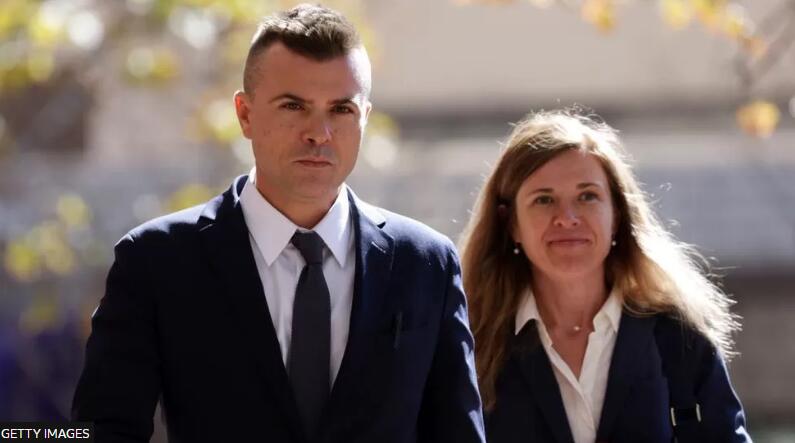
Trump-Russia Steele dossier source acquitted of lying to FBI
A Russian analyst who worked on a discredited dossier linking Donald Trump to Russia has been found not guilty of lying to the FBI.
The Department of Justice charged Igor Danchenko, 43, as part of a probe into the FBI’s inquiry into whether Mr Trump colluded with Russia to win in 2016.
The so-called Steele dossier was used by the FBI to obtain surveillance warrants on a top Trump aide.
Mr Danchenko was accused of lying to agents about the dossier’s sources.
Special counsel John Durham, who brought the charges, was appointed by Mr Trump’s attorney general in 2019 to look into the FBI’s inquiry of ties between Russia and Mr Trump’s 2016 presidential campaign.
The Steele dossier, published by news website Buzzfeed 10 days before Mr Trump took office, made a number of explosive claims linking Mr Trump to the Kremlin – including that Russia had compromising material on the Republican candidate.
Mr Danchenko had reportedly worked with ex-British spy Christopher Steele on the dossier. He went on to become a paid informant for the FBI between 2017-20.
He appeared emotional as the verdict was read, and did not comment after the hearing.
Mr Steele, a former British spy, was hired to compile the dossier by Washington DC-based research firm Fusion GPS, which was itself retained by a law firm on behalf of Mr Trump’s political opponents, Hillary Clinton, the Democratic candidate in the 2016 election, and the Democratic National Committee.
According to the federal indictment, a US-based public relations executive “who was a long-time participant in Democratic Party politics” was “a contributor of information” to the dossier.
Mr Danchenko, prosecutors alleged, lied to agents when he said he had never spoken with the executive – who he said he believed to be then-head of the Russian-American Chamber of Commerce Sergei Millian – about the dossier allegations.
Mr Danchenko was charged with lying to the FBI on five counts in 2017, “regarding the sources of certain information that he provided to a UK investigative firm”.
On Friday, a judge in Alexandria, Virginia, dismissed one of the charges against Mr Danchenko, saying that the government had failed to present sufficient evidence of a crime.
The jury declared him not guilty on the remaining four charges on Tuesday.
On the witness stand, two FBI agents called by the prosecution described Mr Danchenko as honest, leading government lawyers to denounce the credibility of their own witnesses.
“He deserved more than to be exposed because a bunch of politicians put politics over national security,” a lawyer for Mr Danchenko argued at his week-long trial.
As early as July 2016, US investigators began to examine whether there were any links between Mr Trump and the Kremlin in an operation known as Crossfire Hurricane. This led the following year to a major investigation headed by special counsel Robert Mueller.
The dossier was the basis for a wiretap on Trump adviser Carter Page. A former FBI lawyer, Kevin Clinesmith, who worked on the Carter Page case, later pleaded guilty to altering an email related to the surveillance application.
“The FBI surveilled a US citizen for nearly a year based on those lies,” a lawyer for the government argued in court, in reference to Mr Page.
Tuesday’s not-guilty verdict represented the second defeat in this investigation for special counsel Mr Durham, who personally argued much of the prosecution’s case in court.
“While we are disappointed in the outcome, we respect the jury’s decision and thank them for their service,” Mr Durham said in a statement after the verdict.
In May, a Washington DC jury acquitted cyber-security lawyer Michael Sussmann of lying to the FBI and concealing his ties to Hillary Clinton’s campaign.
In 2019, the Mueller investigation concluded that it could not determine any criminal conspiracy between Moscow and the Trump campaign.
It also found that Russia had interfered in the election “in sweeping and systematic fashion”, and outlined 10 times when Mr Trump possibly impeded the investigation.
Following this, the Trump administration announced an investigation into the origins of the inquiry into Russian interference. Mr Trump had long called for such a probe.
Then-Attorney General William Barr appointed Mr Durham, a US attorney in Connecticut, as the senior federal prosecutor.
This was the third and likely final prosecution by Mr Durham’s team. Supporters of Mr Trump had alleged that his over three-year probe would unveil a conspiracy against him.
Comments (0)